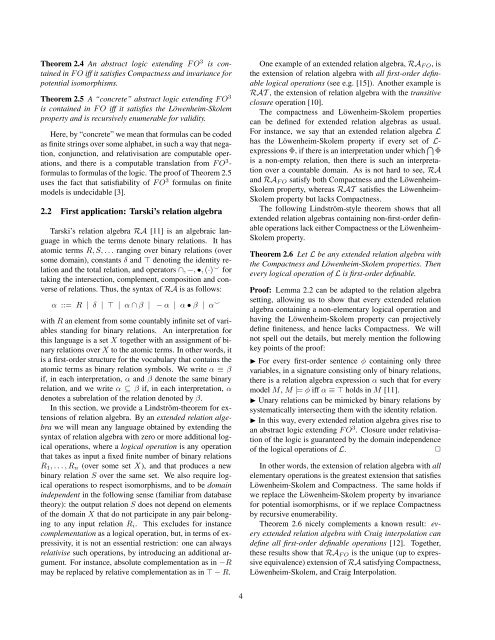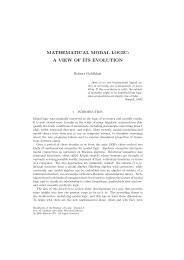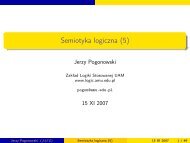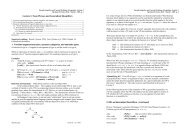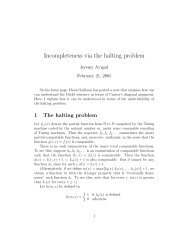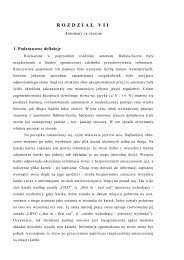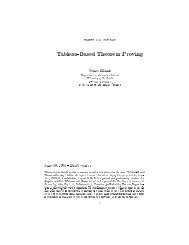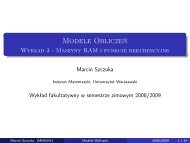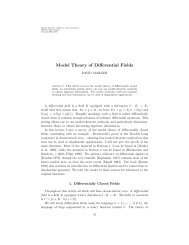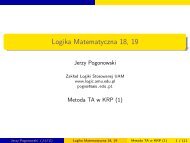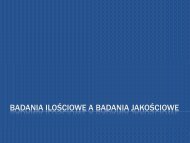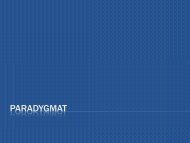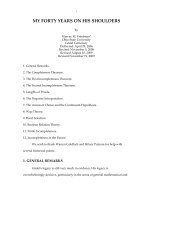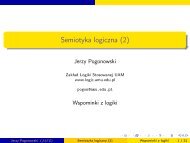Lindström theorems for fragments of first-order logic
Lindström theorems for fragments of first-order logic
Lindström theorems for fragments of first-order logic
You also want an ePaper? Increase the reach of your titles
YUMPU automatically turns print PDFs into web optimized ePapers that Google loves.
Theorem 2.4 An abstract <strong>logic</strong> extending F O 3 is containedin F O iff it satisfies Compactness and invariance <strong>for</strong>potential isomorphisms.Theorem 2.5 A “concrete” abstract <strong>logic</strong> extending F O 3is contained in F O iff it satisfies the Löwenheim-Skolemproperty and is recursively enumerable <strong>for</strong> validity.Here, by “concrete” we mean that <strong>for</strong>mulas can be codedas finite strings over some alphabet, in such a way that negation,conjunction, and relativisation are computable operations,and there is a computable translation from F O 3 -<strong>for</strong>mulas to <strong>for</strong>mulas <strong>of</strong> the <strong>logic</strong>. The pro<strong>of</strong> <strong>of</strong> Theorem 2.5uses the fact that satisfiability <strong>of</strong> F O 3 <strong>for</strong>mulas on finitemodels is undecidable [3].2.2 First application: Tarski’s relation algebraTarski’s relation algebra RA [11] is an algebraic languagein which the terms denote binary relations. It hasatomic terms R, S, . . . ranging over binary relations (oversome domain), constants δ and ⊤ denoting the identity relationand the total relation, and operators ∩, −, •, (·) ⌣ <strong>for</strong>taking the intersection, complement, composition and converse<strong>of</strong> relations. Thus, the syntax <strong>of</strong> RA is as follows:α ::= R | δ | ⊤ | α ∩ β |− α | α • β | α ⌣with R an element from some countably infinite set <strong>of</strong> variablesstanding <strong>for</strong> binary relations. An interpretation <strong>for</strong>this language is a set X together with an assignment <strong>of</strong> binaryrelations over X to the atomic terms. In other words, itis a <strong>first</strong>-<strong>order</strong> structure <strong>for</strong> the vocabulary that contains theatomic terms as binary relation symbols. We write α ≡ βif, in each interpretation, α and β denote the same binaryrelation, and we write α ⊆ β if, in each interpretation, αdenotes a subrelation <strong>of</strong> the relation denoted by β.In this section, we provide a Lindström-theorem <strong>for</strong> extensions<strong>of</strong> relation algebra. By an extended relation algebrawe will mean any language obtained by extending thesyntax <strong>of</strong> relation algebra with zero or more additional <strong>logic</strong>aloperations, where a <strong>logic</strong>al operation is any operationthat takes as input a fixed finite number <strong>of</strong> binary relationsR 1 , . . . , R n (over some set X), and that produces a newbinary relation S over the same set. We also require <strong>logic</strong>aloperations to respect isomorphisms, and to be domainindependent in the following sense (familiar from databasetheory): the output relation S does not depend on elements<strong>of</strong> the domain X that do not participate in any pair belongingto any input relation R i . This excludes <strong>for</strong> instancecomplementation as a <strong>logic</strong>al operation, but, in terms <strong>of</strong> expressivity,it is not an essential restriction: one can alwaysrelativise such operations, by introducing an additional argument.For instance, absolute complementation as in −Rmay be replaced by relative complementation as in ⊤ − R.One example <strong>of</strong> an extended relation algebra, RA F O , isthe extension <strong>of</strong> relation algebra with all <strong>first</strong>-<strong>order</strong> definable<strong>logic</strong>al operations (see e.g. [15]). Another example isRAT , the extension <strong>of</strong> relation algebra with the transitiveclosure operation [10].The compactness and Löwenheim-Skolem propertiescan be defined <strong>for</strong> extended relation algebras as usual.For instance, we say that an extended relation algebra Lhas the Löwenheim-Skolem property if every set <strong>of</strong> L-expressions Φ, if there is an interpretation under which ⋂ Φis a non-empty relation, then there is such an interpretationover a countable domain. As is not hard to see, RAand RA F O satisfy both Compactness and the Löwenheim-Skolem property, whereas RAT satisfies the Löwenheim-Skolem property but lacks Compactness.The following Lindström-style theorem shows that allextended relation algebras containing non-<strong>first</strong>-<strong>order</strong> definableoperations lack either Compactness or the Löwenheim-Skolem property.Theorem 2.6 Let L be any extended relation algebra withthe Compactness and Löwenheim-Skolem properties. Thenevery <strong>logic</strong>al operation <strong>of</strong> L is <strong>first</strong>-<strong>order</strong> definable.Pro<strong>of</strong>: Lemma 2.2 can be adapted to the relation algebrasetting, allowing us to show that every extended relationalgebra containing a non-elementary <strong>logic</strong>al operation andhaving the Löwenheim-Skolem property can projectivelydefine finiteness, and hence lacks Compactness. We willnot spell out the details, but merely mention the followingkey points <strong>of</strong> the pro<strong>of</strong>:◮ For every <strong>first</strong>-<strong>order</strong> sentence φ containing only threevariables, in a signature consisting only <strong>of</strong> binary relations,there is a relation algebra expression α such that <strong>for</strong> everymodel M, M |= φ iff α ≡ ⊤ holds in M [11].◮ Unary relations can be mimicked by binary relations bysystematically intersecting them with the identity relation.◮ In this way, every extended relation algebra gives rise toan abstract <strong>logic</strong> extending F O 3 . Closure under relativisation<strong>of</strong> the <strong>logic</strong> is guaranteed by the domain independence<strong>of</strong> the <strong>logic</strong>al operations <strong>of</strong> L.✷In other words, the extension <strong>of</strong> relation algebra with allelementary operations is the greatest extension that satisfiesLöwenheim-Skolem and Compactness. The same holds ifwe replace the Löwenheim-Skolem property by invariance<strong>for</strong> potential isomorphisms, or if we replace Compactnessby recursive enumerability.Theorem 2.6 nicely complements a known result: everyextended relation algebra with Craig interpolation candefine all <strong>first</strong>-<strong>order</strong> definable operations [12]. Together,these results show that RA F O is the unique (up to expressiveequivalence) extension <strong>of</strong> RA satisfying Compactness,Löwenheim-Skolem, and Craig Interpolation.4


